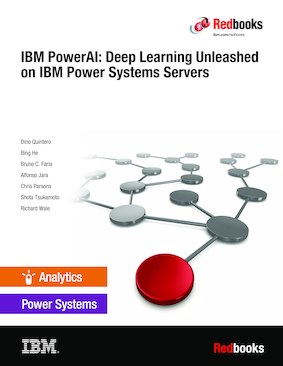Abstract
This IBM® Redbooks® publication is a guide about the IBM PowerAI Deep Learning solution. This book provides an introduction to artificial intelligence (AI) and deep learning (DL), IBM PowerAI, and components of IBM PowerAI, deploying IBM PowerAI, guidelines for working with data and creating models, an introduction to IBM Spectrum™ Conductor Deep Learning Impact (DLI), and case scenarios.
IBM PowerAI started as a package of software distributions of many of the major DL software frameworks for model training, such as TensorFlow, Caffe, Torch, Theano, and the associated libraries, such as CUDA Deep Neural Network (cuDNN). The IBM PowerAI software is optimized for performance by using the IBM Power Systems™ servers that are integrated with NVLink. The AI stack foundation starts with servers with accelerators. graphical processing unit (GPU) accelerators are well-suited for the compute-intensive nature of DL training, and servers with the highest CPU to GPU bandwidth, such as IBM Power Systems servers, enable the high-performance data transfer that is required for larger and more complex DL models.
This publication targets technical readers, including developers, IT specialists, systems architects, brand specialist, sales team, and anyone looking for a guide about how to understand the IBM PowerAI Deep Learning architecture, framework configuration, application and workload configuration, and user infrastructure.
Table of Contents
Chapter 1. Introduction to artificial intelligence and deep learning
Chapter 2. Introduction and overview of IBM PowerAI
Chapter 3. IBM PowerAI components
Chapter 4. Deploying IBM PowerAI
Chapter 5. Working with data and creating models in IBM PowerAI
Chapter 6. Introduction to IBM Spectrum Conductor Deep Learning Impact
Chapter 7. Case scenarios: Using IBM PowerAI
Appendix A. Sentiment analysis code
Appendix B. Problem determination tools
